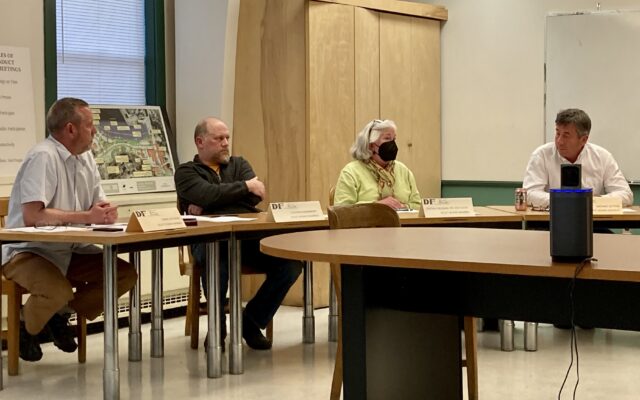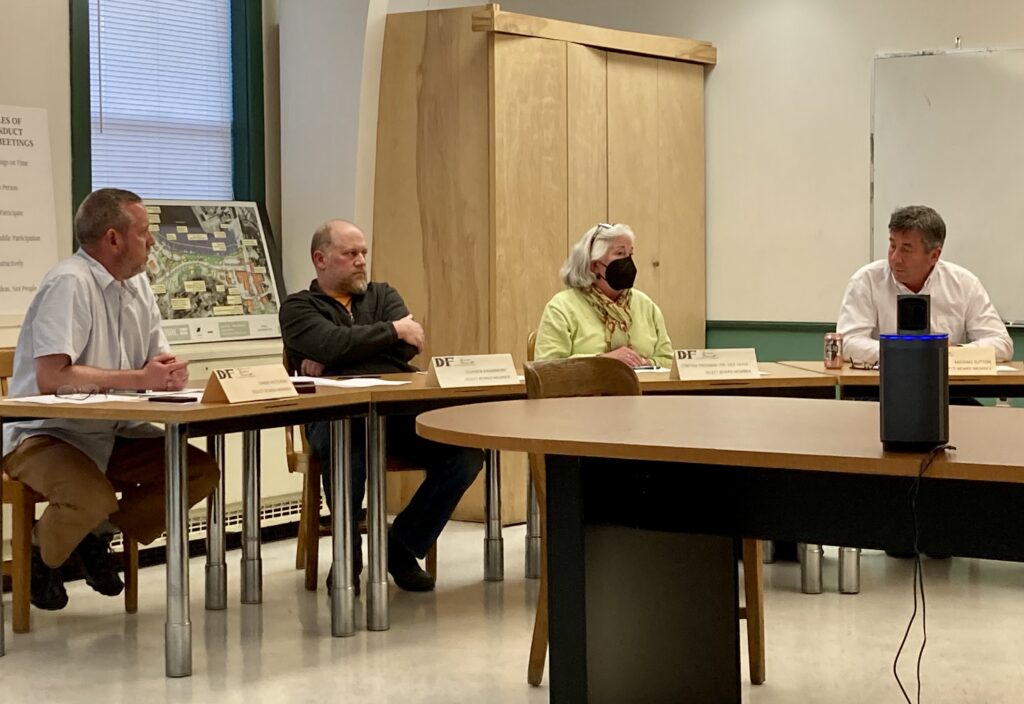
Dover-Foxcroft to put a block on its new medical marijuana caregiver ordinance
DOVER-FOXCROFT — The Dover-Foxcroft Select Board is expected to block parts of a new medical marijuana caregiver ordinance that is adversely affecting another group of people.
Voters passed the ordinance last month that would require medical marijuana caregivers to get a permit in Dover-Foxcroft beyond the required state license. It was meant to stop people from growing marijuana without proper licensure and facilities.
But town boards will now have to take emergency measures to fix it due to the unintended consequences the ordinance has on local families.
Dover-Foxcroft resident Charles Hildebrant told the board Monday about Bettie, his mother-in-law who was diagnosed with Alzheimer’s disease in 2013 and relies on medical marijuana and will be hurt by the new ordinance.

ORDINANCE DISCUSSION — From left to right, Dover-Foxcroft Select Board members Barry Hutchins, Stephen Grammont, Cindy Freeman Cyr and Michael Sutton discuss a recently passed land use ordinance pertaining to marijuana at a meeting Monday.
Following four years of conventional medical care and strong medications such as antipsychotics, Bettie tried medical marijuana, which provided immediate relief and has added years to her life, he said.
Language in the marijuana ordinance could harm Bettie because it prevents Hildebrant and his family from growing the cannabis that eases her pain, he said. After hearing Bettie’s story, the Select Board decided it needs to revisit the ordinance.
Because of the time-sensitive nature of Hildebrant’s concern, the board could pass a moratorium so newly placed restrictions would be paused while the town considers any larger changes to the ordinance, Town Manager Jack Clukey said.
“Somehow, without an alarm being sounded through the hospice community [and] somehow without neighbors alerting us, language was written in the amended land use ordinance that might effectively take away Bettie’s sacred plant,” Hildebrant said.
He pointed to a section of the ordinance that lists performance standards for marijuana activities. For example, “the minimum setback from any property line for the cultivation of marijuana is 25 feet in the village, hamlet, rural residential and downtown districts,” and 50 feet in all other districts, according to the ordinance.
The section also calls for an enclosed and locked facility; screening that allows for no exterior evidence of cultivation, processing or storage of marijuana; proper ventilation and odor management; and other requirements.
“When you actually try to apply that, most properties could not have that structure,” said Hildebrant, who lives in the village district, on Tuesday. “You also have to comply with the rest of the land use code.”
The new restrictions will lead to hardship for patients and their families, he said. Many local properties don’t have enough room to situate such a structure, and it could cost thousands of dollars to meet the requirements outlined in the ordinance.
Patients with sufficient funds and space would likely have to wait until 2023 before a facility that meets specifications could be built because of recent material shortages and the difficulty of finding an available contractor, he said.
Hildebrant and his family members are not medical marijuana caregivers and aren’t required to be registered as such, he said. Because they care for a family member in the same home, and Bettie has a medical marijuana ID card, they are allowed to grow and provide medical marijuana to her without falling under the registered caregiver title, he said.
Select Board member Stephen Grammont, who also serves on the town’s land use committee, said that group should have a hard look at language in the ordinance to eliminate unintended consequences.
The ordinance was predominantly created to stop people from commercial-scale growing without proper licensure and facilities, he said. The town ran into some problems that infringed on other residents’ rights, so an ordinance was written, he said.
Select Board member Michael Sutton asked about the urgency of the issue.
“Technically it’s illegal right now for me to put those plants outside, and they’re ready to go outside,” Hildebrant said. “Time is everything. It takes the season to produce the crop.”
The board voted to hold a public hearing on the moratorium at its next meeting. The meeting is set for 6:30 p.m. May 23, at the Dover-Foxcroft Municipal Building.
If the moratorium passes and the ordinance is revisited, Hildebrant would like to see the town form a committee of stakeholders, including people from the caregiver and hospice environments and possibly a physician, so mistakes aren’t repeated, he said. Hildebrant wants to be involved in how ordinance language is revised, he said.